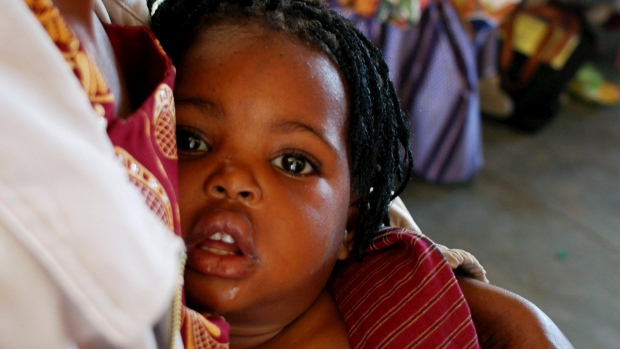77per cent of Mozambican children live in poverty
Substantial decline in mortality from Malaria in Mozambique

CBC News (File photo) / A child awaits treatment for malaria at the Manhica Hospital, near the capital Maputo
Although the number of reported cases of malaria in Mozambique increased last year, there was a substantial decline in mortality from the disease, according to Health Minister Nazira Abdula.
Speaking in the northern city of Nampula, at an event marking World Malaria Day, Abdula said 6,418,516 cases of malaria were notified in 2015, compared with 5,820,340 in 2014 – an increase of just over ten per cent.
However, in 2015 there were about 2,400 deaths from malaria (most of them children), which is a decline of 26 per cent on the 2014 figure of 3,245.
Abdula said that the high number of malaria cases remains a major concern for the government. The level of absenteeism from school and from work that malaria entails holds up the economic and social development of the country, and maintains the cycle of disease and poverty.
“Despite the knowledge we have of malaria, and though there wre some improvements last year, it remains a killer disease and one of the major public health problems in our country”, she added.
Major strides had been taken in malaria prevention, Adula said. In 2015, there had been mass distribution of mosquito nets in 41 of the country’s 151 districts, reaching about 95 per cent of the population of those districts. 19 districts were covered by house to house spraying against mosquitoes, and 92 per cent of the population living in these areas had been protected. 85 per cent of pregnant women attending ante-natal consultations benefitted from mosquito nets.
As for anti-malarial drugs, Abdula said Mozambique has adopted artimisinin combined therapy, which not only cures patients, but helps prevent the malaria parasite from developing drug resistance. “These therapeutic combinations have been associated with studies on resistance carried out routinely by our research institutions.
These medicines, she explained, are distributed down to community level, where they are administered by community health workers, who are trained to diagnose malaria.
There are encouraging signs internationally that malaria is on the retreat. Globally, deaths from the disease fell by 60 per cent between 2000 and 2015, and cases of malaria declined by 37 per cent. Over this period an estimated 6.2 million lives were saved.
But in 2015, there were still 214 million cases of the diseases and 438,000 malaria deaths, 90 per cent of them in sub-Saharan Africa.












Leave a Reply
Be the First to Comment!
You must be logged in to post a comment.
You must be logged in to post a comment.